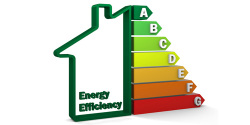

With the Green Deal cashback scheme launch now less than one month away, HVP cuts through the confusion to reveal how the scheme could help grow your business
The Green Deal has been designed as an incentive to substantially increase the number of energy-efficiency measures being installed in UK homes and businesses. By accessing Green Deal finance, homeowners will be able to install a wide range of products with no upfront cost. Instead, they take out a loan against their property, which is then paid back through their energy bills, and offset by the resultant savings.
Other measures including hot water controls, showers, taps and pipework insulation will also be eligible, though primarily for the non-domestic market at this stage.
Businesses must play their part by ensuring that their services can achieve the estimated savings based on the Golden Rule.
The government’s target is to improve the energy efficiency of 14 million homes over the next 10 years, and DECC believes the Green Deal could be supporting 100,000 jobs within five years.
Heat pump installations in particular have a huge potential for growth under the Green Deal. The government’s 4th Carbon Budget has set a target of 600,000 domestic heat pumps to be installed by 2020 – and 10 times that by 2030 – whereas currently fewer than 15,000 are fitted annually.
If the predicted demand materialises, clearly there will be a lot of installation and maintenance work available for those who are qualified.
The Feed-in Tariff (FiT) scheme, which has been in operation since 1 April, 2010 for solar PV and microCHP technologies, among others, will run alongside the Green Deal, providing additional financial incentives for homeowners who install Microgeneration Certification Scheme (MCS)-accredited technologies.
However, the FiT can only be accessed if the installation is carried out by MCS-accredited installers, and with only approximately 860 accredited air-to-water heat pump installers in the UK, finding an accredited engineer can prove difficult.
The register for Green Deal Providers, Assessors and Installers opened on 8 August, allowing businesses interested in becoming authorised Green Deal Assessors and Installers to apply for their accreditations through certification bodies such as UKAS and BSI.
Green Deal Providers will be the main contact for consumers, therefore the Energy Saving Trust (EST) recommends that SMEs and installers align themselves with one, or more, to maximise the opportunities for their own businesses.
The Green Deal provider chosen should be the one which is most relevant to their business, and which can help provide added value to the service or measure they plan to offer as part of the Green Deal.
In addition, various consortiums for SMEs are also starting to take shape which will be specifically focused on providing Green Deal help and support.
To participate in the Green Deal, businesses have to become certified. This will enable installers to sell their services under the Green Deal banner to consumers, and will also enable them to use the Green Deal quality mark.
According to EST, the main benefit of becoming a certified Green Deal installer is business recognition, which it believes is a valuable selling point in what is likely to become, in time, a very crowded marketplace.
Overall 14 organisations have so far been awarded UKAS accreditation to provide certification of Green Deal installers and advisors. EST, one of these 14, helped to create the Green Deal Installation standard – PAS2030 – which is now used to assess all installers who apply for Green Deal accreditation.
The PAS 2030 installer certification is not just relevant for the Green Deal, but is also mandatory for the Energy Company Obligation (ECO), and can be used as a standalone certification that businesses and installers can use to gain more private work.
ECO will be launched next month at the same time as the Green Deal, and will take over from the existing Carbon Emissions Reduction Target (CERT) and Community Energy Saving Programme (CESP) schemes.
Under the ECO, energy companies will have an obligation to provide additional help to low-income and vulnerable consumers who wish to improve the energy-efficiency of their properties, as well as those living in hard-to-treat buildings.
Since the ECO will be led by energy companies rather than Green Deal Providers, EST is recommending that installers interested in getting involved should start speaking to the energy companies now.
This does, of course, put the onus on installers to make sure they are recommending and fitting products that will achieve the promised energy savings for households. However, Elaine Berry, customer services manager at EST, recognises that many installers need to be provided with more information about these products and their energy performance.
“Installers and householders require some form of reassurance and confidence that the products they choose to install under Green Deal are of good quality and will deliver high energy-efficiency performance.
“Our Energy Saving Trust Recommended scheme provides a list of recommended products independently measured against our own robust standards which we feel can provide reassurance to help installers.”
Overall the Green Deal presents great opportunities for both SMEs and installers. However, the scheme as a whole will only work if government, business, households and organisations work together to maximise these opportunities and help one another fulfil the scheme’s potential. If this happens then there is no reason why the Green Deal can’t be a success.
If you'd like to keep up-to-date with the latest developments in the heating and plumbing industry, why not subscribe to our weekly newsletters? Just click the button below and you can ensure all the latest industry news and new product information lands in your inbox every week.